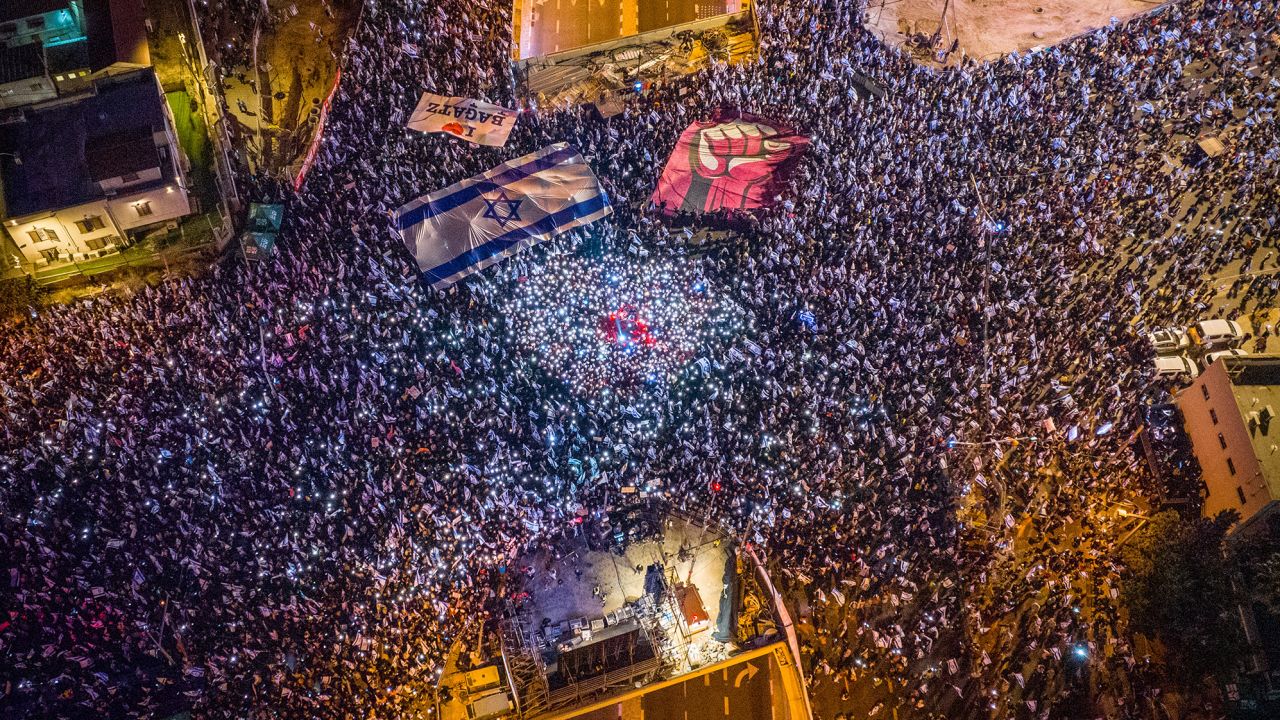Several large-scale law reforms in Israel that some claim endangers the nation’s democratic foundations have prompted hundreds of thousands of Israelis to frequently demonstrate in the streets across the nation.
Fundamentally, the judicial reform would give the Knesset, the Israeli parliament, and consequently the ruling parties, more control over Israel’s judiciary.
The modifications would represent the biggest overhauls of Israel’s judicial system since its establishment in 1948, affecting everything from judge selection to the legislation the Supreme Court can decide on to granting parliament the authority to overrule Supreme Court rulings.
The suggested reforms are not completely original.
Many political figures have previously urged for changes to Israel’s courts.
Only a set of quasi-constitutional fundamental laws serve as Israel’s written constitution, giving the Supreme Court even greater authority. But aside from the Supreme Court, Israel lacks any other means of limiting the influence of the Knesset.
What you should know is as follows.
A group of laws that make up the judicial reform package must all pass three votes in the Knesset in order to become law.
The law that modifies the composition of the nine-member committee that chooses judges to give the government a majority of the committee’s members is one of the most crucial components for the Netanyahu administration.
The Supreme Court, according to Netanyahu and his followers, has turned into an exclusive, elitist group that does not speak for the Israeli people. They contend that the Supreme Court has overstepped its bounds and ruled on matters that it should not have.


The prime minister has cited nations like the United States, whose political leaders have control over who is selected and confirmed as a federal judge, to defend his proposals.
The override clause, which would grant the Israeli parliament the authority to introduce laws previously deemed illegal by the court, basically overriding Supreme Court rulings, is another important component of the revisions.
Supporters argue that the Supreme Court shouldn’t restrict the public’s ability to choose the lawmakers who will represent them in office.
Justice Minister Yariv Levin said, “We go to the polls, we vote, and time and time again, those we did not elect decide for us,” when the amendments were announced at the beginning of January.
Another bill that has just been approved makes it more difficult for a serving prime minister to be deemed unfit for office. It limits the grounds for such a statement to physical or mental incapacity and requires approval from either the prime minister themselves or two-thirds of the cabinet.
The measure that would declare a prime minister “unfit for office” has the most impact on Netanyahu, even if several bills might have that effect.
Opponents assert that Netanyahu is advancing the reform because of his own ongoing corruption case, in which he is accused of fraud, bribery, and breach of trust. He claims he did nothing wrong.
Opposition leaders primarily saw that bill as a means of preventing Netanyahu from being deemed ineligible for office as a result of the trial.
Netanyahu agreed to a conflict of interest statement as part of a compromise with the court to continue to hold the office of prime minister despite being on trial. The Attorney General concluded that because of the proclamation, Netanyahu was not permitted to participate in the formulation of the judicial reform’s policies. The attorney general has written an open letter to Netanyahu stating that he is in violation of the agreement and the law, and a petition asking the Israeli Supreme Court to deem Netanyahu unfit for office on the grounds that he violated that conflict of interest declaration is currently before the court.
Additionally, detractors claim that if the government has more influence over the selection of judges, Netanyahu’s loyalists will nominate judges who they are confident will rule in his favour.

Netanyahu has already made public statements in favour of an independent judiciary. Netanyahu responded to CNN’s Jake Tapper when asked why he continues to favour such a reform despite these statements in the media: “I haven’t changed my view. I believe that we require a powerful, impartial judiciary. Yet, a free-wheeling judiciary is not what an independent judiciary entails, which is what has occurred in this country during the past 25 years.
Weakening the legal system might make it harder for Israelis and Palestinians to ask a court to defend their rights when they think the government has done something to violate those rights.
In addition to Palestinian citizens of Israel or those who possess residency cards, people who live in the occupied West Bank could also be impacted. Gaza, which is governed by the Palestinian militant organisation Hamas, is not subject to the decisions of Israel’s Supreme Court.
The rights of minorities in Israel, particularly Palestinian residents of Israel, are a concern for many who oppose the changes because they fear that if politicians have greater power, such rights will suffer.
For instance, in the tense East Jerusalem neighbourhood of Sheikh Jarrah, where Israeli organisations have asserted ownership of the property the family have lived on for decades, the court last year blocked the evictions of Palestinian residents.

The far-right and settlers in Israel have also complained about the high court, claiming it is biassed against them and that it authorised the evacuation of settlers from Gaza and the northern West Bank in 2005.
Concern has been expressed about the reform in Israel’s financial, commercial, security, and academic sectors.
The only available method of supplying checks and balances to the Israeli legislative branch, according to critics, will be entirely destroyed by the makeover because it goes too far.
Others fear that it will undermine the independence of the Israeli judiciary and rights like minority rights and freedom of expression that are not protected by Israel’s essentially constitutional core laws.
Only a small percentage of Israelis approve the reforms, according to polling by the Israel Democracy Institute that was issued in February. 72% of Israelis want a compromise to be achieved, but even then, 66% believe the Supreme Court should have the authority to overturn law, and 63% believe the current process for choosing judges should continue.
High-tech industry insiders, who are normally apolitical, have also spoken out against the measures. CEO of cybersecurity company Wiz Assaf Rappaport has stated that due to the instability around the reform, Wiz will not be relocating any of the $300 million in funds it just raised to Israel.
Amir Yaron, governor of Israel’s central bank, told CNN’s Richard Quest that the reforms are too “hurried” and run the danger of hurting the economy.
Several former Mossad directors have also come out against the revisions, warning that disagreement on the subject compromises Israeli security. Hundreds of Israeli army reservists have threatened not to report for duty if the reforms are approved because they feel that Israel will no longer be a true democracy as a result of the changes.
The government’s legislation, according to Israeli President Isaac Herzog, is “misguided, cruel, and weakens our democratic underpinnings,” and he cautioned that Israel may be headed for “civil war.” Although Herzog has been actively advocating for dialogue with all parties, the Israeli presidency is essentially a ceremonial position.
Also, on a global scale, Israel’s friends, particularly the United States, have voiced their alarm over the revision.
In a mid-March phone chat with Netanyahu, US President Joseph Biden reportedly advised him that “true checks and balances improve democratic societies, and that major changes should be sought with the broadest possible basis of popular support.”
The protest leaders have stated that they intend to step up their protests until the law is stopped. But, the government asserts that when it was elected in November of last year, voters permitted them to enact the reform.
Yet in mid-March, the coalition government announced that it had changed the measure that would restructure the committee that chooses judges, softening its stance for the first time. The government-appointed members would only hold a one-seat majority on the committee, as opposed to holding the large majority of the appointed seats.
On March 23, Netanyahu vowed to continue pressing the reforms, despite his defense minister almost speaking out against them due to their potential impact on Israeli national security.
In response to his request, opposition politicians stated they would only meet with him to discuss if the parliamentary process was put on hold.
Further complicating matters, the Supreme Court may have to deliberate on measures restricting its power if the bills are approved by parliament. This increases the likelihood of a constitutional impasse. If the laws were overturned by the Supreme Court, what would the government do in that case?


